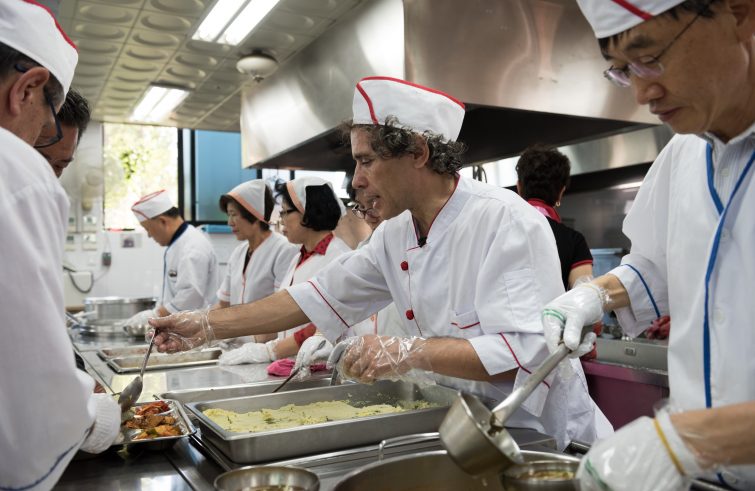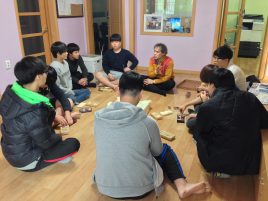
“Everything is changing rapidly here. The Korea I found when I arrived in 1990 no longer exists, it’s a completely different country, it’s almost unrecognisable.” Father Vincenzo Bordo of the Oblates of Mary Immaculate speaks from Seoul. He has been living here for 33 years and is known to many for his service to the underprivileged: he runs soup kitchens for the poor, shelters for street children, helps the sick and lonely, and cares for the elderly.
From ‘us’ to ‘me’. Speaking to Popoli e Missione, Father Bordo describes a struggling community living in the shadow of one of Asia’s most technologically advanced, prosperous and futuristic cities: the iconic capital of one of the world’s ten most industrialised nations. Bordo is a young man with grey hair, born in 1957, and an enchanting smile. He describes the extraordinary “economic development of recent decades, coupled with many social changes. The least noticeable but most influential of these changes is cultural. In a positive sense, if you look at the rise of ‘K culture’: songs, films, food, widespread prosperity. But it is negative when you look at other data:
South Korea is the country with the highest suicide rate, the lowest birth rate, a high divorce rate (around 30%), a rapidly ageing population with many lonely and marginalised elderly people.
Perhaps the most striking aspect is the shift from a ‘us’ culture to a ‘me’ culture. He remembers the values that made him fall in love with these people – the willingness to dedicate oneself to the community, to the nation; the popular religious sentiment and devotion, “important values that no longer exist today. When I first arrived, there was a very strong sense of belonging, everyone made efforts and sacrifices for the good of the community. Now all that matters is personal fulfilment, happiness. Korean society is becoming increasingly individualistic, closed in on itself, with little regard for collective development.”
 North-South tensions. Life in the southern part of the Korean peninsula is very different from life on the other side of the infamous 38th parallel dividing line, i.e. dictator Kim Jong-Un’s North Korea and its communist regime. In 1945, following the defeat and surrender of Japan in the Second World War, the Asian country was divided into two occupation zones: a US-led zone (the Republic of Korea, with its capital in Seoul) and a pro-Soviet zone (the Democratic People’s Republic of Korea, with its government in Pyongyang). Since then, family members separated by an agreed border have lived in two parallel and very different cultures that have shaped distant lifestyles, political, economic and social systems: capitalist, Western and democratic in the South; state-controlled, totalitarian and with a strong focus on arms spending in the North. The hostilities of the Korean War ended in 1950 with the signing of an armistice. But a final peace settlement was never reached. The large border zone separating the two states remained heavily fortified and laced with landmines. Despite this, inter-Korean relations have been rocky, marked by periods of rapprochement and air raid alerts sounding in Seoul due to missiles fired from Pyongyang.
North-South tensions. Life in the southern part of the Korean peninsula is very different from life on the other side of the infamous 38th parallel dividing line, i.e. dictator Kim Jong-Un’s North Korea and its communist regime. In 1945, following the defeat and surrender of Japan in the Second World War, the Asian country was divided into two occupation zones: a US-led zone (the Republic of Korea, with its capital in Seoul) and a pro-Soviet zone (the Democratic People’s Republic of Korea, with its government in Pyongyang). Since then, family members separated by an agreed border have lived in two parallel and very different cultures that have shaped distant lifestyles, political, economic and social systems: capitalist, Western and democratic in the South; state-controlled, totalitarian and with a strong focus on arms spending in the North. The hostilities of the Korean War ended in 1950 with the signing of an armistice. But a final peace settlement was never reached. The large border zone separating the two states remained heavily fortified and laced with landmines. Despite this, inter-Korean relations have been rocky, marked by periods of rapprochement and air raid alerts sounding in Seoul due to missiles fired from Pyongyang.
Today, few remember the almost 70-year separation, “people have other things to worry about, they just forgot,” Bordo explains. “When North Korea fires a missile, the air raid sirens go off and people take cover in basements and shelters.
But people know that if there were a nuclear explosion from the neighbouring country, the latter would be wiped out first. No one cares that the post-war armistice between the two Koreas was never formalised by a peace treaty. As we speak, people are strolling by, the streets are full of kids talking on their mobile phones and listening to music.
 Those who are excluded. In Samsung’s Korea, western lifestyles prevail, and the young generation is the offspring of modernity, of a globalised culture that transcends nations and continents. In what was once a young country, the birth rate has fallen dramatically and the population is ageing at the same rate as Italy. “Young people today are individualists, capitalists, consumerists,” continues Father Vincenzo. “The population is ageing, young people who get married don’t want children. Life is moving at a fast pace, today’s civilisation is multifaceted, complex, with no respite. Those who cannot keep up are left behind: lonely old people, street children, social outcasts. They are the new poverty of an affluent world.” Father Vincenzo knows these realities. He has created a support network that includes six shelters for the homeless, a soup kitchen that serves about 500 meals a day to people who, in 70% of cases, eat only once a day, as Bordo explains in his recently published book ‘Chef per amore’ (Edizioni Cvs).
Those who are excluded. In Samsung’s Korea, western lifestyles prevail, and the young generation is the offspring of modernity, of a globalised culture that transcends nations and continents. In what was once a young country, the birth rate has fallen dramatically and the population is ageing at the same rate as Italy. “Young people today are individualists, capitalists, consumerists,” continues Father Vincenzo. “The population is ageing, young people who get married don’t want children. Life is moving at a fast pace, today’s civilisation is multifaceted, complex, with no respite. Those who cannot keep up are left behind: lonely old people, street children, social outcasts. They are the new poverty of an affluent world.” Father Vincenzo knows these realities. He has created a support network that includes six shelters for the homeless, a soup kitchen that serves about 500 meals a day to people who, in 70% of cases, eat only once a day, as Bordo explains in his recently published book ‘Chef per amore’ (Edizioni Cvs).
 “Let’s go and look for them.” ‘Anna’s House’ is a non-profit organisation that shelters the homeless, the marginalised, the elderly, and street children. They are the outcasts of the capital city. Father Vincenzo says: “Many marriages end in divorce and children are left in the custody of the father, who often cannot care for them alone. If he remarries and has children with his new wife, she takes care of her children and neglects the others.
“Let’s go and look for them.” ‘Anna’s House’ is a non-profit organisation that shelters the homeless, the marginalised, the elderly, and street children. They are the outcasts of the capital city. Father Vincenzo says: “Many marriages end in divorce and children are left in the custody of the father, who often cannot care for them alone. If he remarries and has children with his new wife, she takes care of her children and neglects the others.
Most children end up on the streets as a result of domestic violence. We provide them with psychological counselling, rehabilitation programmes and help them to obtain a diploma so that they can work and integrate into society.
The biggest challenge is to help them regain their confidence in the adult world. We have a mobile outreach unit that travels by bus, we don’t wait for them to knock on our door, we go and visit them ourselves.”
*Popoli e Missione












